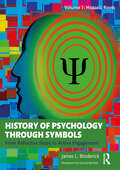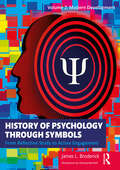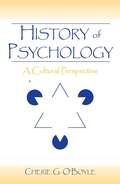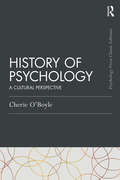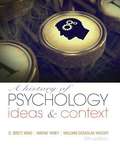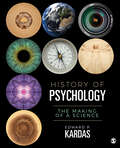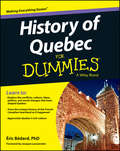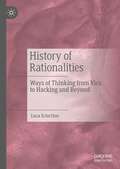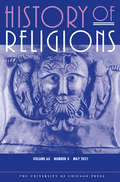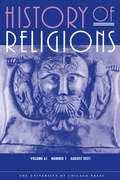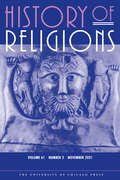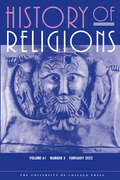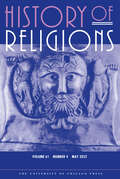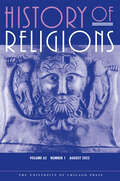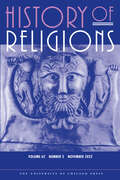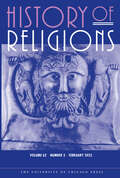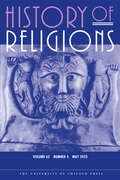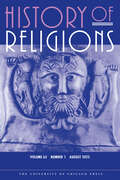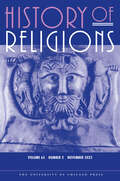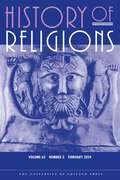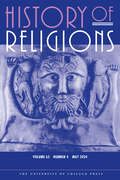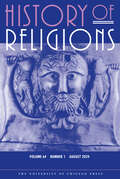- Table View
- List View
History of Psychology through Symbols: From Reflective Study to Active Engagement. Volume 1: Historic Roots
by James BroderickVolume One of The History of Psychology through Symbols provides a groundbreaking approach by expanding the roots of psychology beyond the Greeks to concurrent events during the same period (800 BCE–200 BCE), defined as the Axial Age by German-Swiss psychiatrist Karl Jaspers. The Axial Age emphasized seeking the universal connection that unites all humanity, a focus not on what one believed, but how one lived. This includes the human desire to connect to something greater, the totality of being human, explained by using symbols, the universal language. This volume describes the psychological implications of the Axial Age through the developments of Buddhism, Hinduism, Confucianism, Daoism, Judaism, and Zoroastrianism, as well as Greek thought. Rooted in the Axial Age, Volume One explores how the Christian and Islamic eras influenced psychology, which resulted in the Renaissance and the Scientific Revolution, which provided the historic roots of modern psychology. Rejecting the idea that science transcends historical events, this volume provides a political, socioeconomic, and cultural context for all the historic developments. The chapter on the history of mental illness provides inspiration for a new mental health system with specific recommendations for radical system reform. In the spirit of the Axial Age on the importance of how one lives, there is an emphasis on engagement with symbols and with specific exercises, called emancipatory opportunities, to apply the lessons of psychological history to daily life. This book is ideal for those seeking a dynamic and engaging way of learning about or teaching the history of psychology and would also be of interest to students, practitioners, and scholars of science, philosophy, history and systems, religious studies, art, and mental health and drug and alcohol treatment, as well as those interested in applying the lessons of history to daily life.
History of Psychology through Symbols: From Reflective Study to Active Engagement. Volume 2: Modern Development
by James BroderickVolume Two of The History of Psychology through Symbols continues a groundbreaking approach of using symbols to deepen the understanding of psychological history as well as the importance of how one lives, an emphasis on engagement with symbols and with specific exercises, called emancipatory opportunities, to apply the lessons of psychological history to daily life. From the birth of modern psychology in the laboratory of Wilhelm Wundt, Volume Two discusses how the early theories of voluntarism, structuralism, evolution, and pragmatism influenced the modern development of psychology. The importance of making unconscious shadow forces in science conscious is explored through the impact of the eugenic movement, the controversies surrounding the development of psychological testing, and current research biases in psychology. Volume Two describes how clinical psychology emerged as a powerful profession in mental health care. The Four Forces of Psychology are explored through their natural and hermeneutic science influences. Psychoanalytic and Jungian analytical psychology comprise the first force, behaviorism the second force, humanistic-existential the third force, and transpersonal psychology the fourth force that includes a groundbreaking discussion of psychedelic history and research that could revolutionize mental health and drug and alcohol treatment. Rejecting that science transcends historical events, this volume provides a political, socioeconomic, and cultural context for modern psychology and all Four Forces of Psychology. This book is ideal for those seeking a dynamic and engaging way of learning about or teaching the history of psychology and would also be of interest to students, practitioners, and scholars of science, philosophy, history and systems, religious studies, art, and mental health and drug and alcohol treatment, as well as those interested in applying the lessons of history to daily life.
History of Psychology: A Cultural Perspective
by Cherie G. O'BoyleHistory of Psychology: A Cultural Perspective easily distinguishes itself from other texts in a number of ways. First, it examines the field within the rich intellectual and cultural context of everyday life, cross-cultural influences, and contributions from literature, art, and other disciplines. Second, it is a history of ideas, concepts, and questions, instead of dates, events, or great minds. Third, the book explores the history of applied, developmental, clinical, and cognitive psychology as well as experimental psychology. Conveyed in a lively writing style, this text tells a gripping story that continues to the present day. Its current perspective allows students to connect the history of the field to the work being published in current journals. O’Boyle writes in the “historical present”, giving readers a sense of immediacy and aliveness as they journey through history. Her account uses imaginative new features, including “The Times”, which gives readers a feel for what everyday life was like during the age discussed in the chapter. Descriptions of ordinary life, as well as information about important issues influencing their lives such as wars, social movements, famines, and plagues, pique students' interest. "Stop and Think" questions, scattered throughout, enhance retention and encourage critical thinking. An ideal text for a history of psychology or history and systems of psychology course, this creative new book will also appeal to those with a general interest in the field.The Instructor’s Resource CD, written by the text author, includes class activities and demonstrations, suggestions for small group and class discussions, a list of films and videos related to the material in each chapter, and a test bank with objective and essay questions.
History of Psychology: A Cultural Perspective (Psychology Press & Routledge Classic Editions)
by Cherie O'BoyleThis classic edition includes a new foreword by former APA President Antonio E. Puente which primes the reader for a unique, bold and lively account of the history of psychology that remains relevant and useful to this day. This text surveys core areas in the history of psychology, covering the history of applied, developmental, clinical, cognitive and experimental psychology. O’Boyle writes in the "historical present," which gives readers a sense of immediacy and aliveness as they journey through history. Her account uses imaginative new features, including "The Times," which gives readers a feel for what everyday life was like during the age discussed in the chapter. Descriptions of ordinary life, as well as information about important issues influencing people’s lives such as wars, social movements, famines, and plagues will pique student interest. "Stop and Think" questions, scattered throughout, enhance retention and encourage critical thinking. This book continues to provide a creative, distinct, and valuable contribution to the field, and is an essential read for undergraduate students undertaking courses in the history of psychology and history of science, history and systems of psychology, and introductory psychology.
History of Psychology: Ideas and Context
by Wayne Viney D. Brett King William Douglas WoodyA History of Psychology: Ideas & Context, 5/e, traces psychological thought from antiquity through early 21st century advances, giving students a thorough look into psychology's origins and development. This title provides in-depth coverage of intellectual trends, major systems of thought, and key developments in basic and applied psychology.
History of Psychology: The Making of a Science
by Edward P. KardasHistory of Psychology: The Making of a Science provides students with a comprehensive overview of the formulation of the field of psychological science. Starting with a chapter on 21st Century Psychology and then jumping to the dawn of civilization, author Edward P. Kardas is able to make connections between early understandings of human behavior with our current understandings and interpretations of psychological research. Through highlighting the zeitgeist of the era and making connections to the related fields of philosophy, computational science, biology, and social science, students will have a deeper understanding of how and why the field has formed in its current landscape and a sense for where it’s headed next.
History of Psychology: The Making of a Science
by Edward P. KardasHistory of Psychology: The Making of a Science provides students with a comprehensive overview of the formulation of the field of psychological science. Starting with a chapter on 21st Century Psychology and then jumping to the dawn of civilization, author Edward P. Kardas is able to make connections between early understandings of human behavior with our current understandings and interpretations of psychological research. Through highlighting the zeitgeist of the era and making connections to the related fields of philosophy, computational science, biology, and social science, students will have a deeper understanding of how and why the field has formed in its current landscape and a sense for where it’s headed next.
History of Quebec For Dummies
by Éric BédardGrasp the unique history of Quebec? Easy. Packing in equal parts fun and facts, History of Quebec For Dummies is an engaging and entertaining guide to the history of Canada's second-largest province, covering the conflicts, cultures, ideas, politics, and social changes that have shaped Quebec as we know it today. "My country isn't a country, it is winter!" sings the poet Gilles Vigneault . . . Indeed, Quebec is winter, snow, cold, and freezing winds. It is also the majestic river Saint-Laurent and its numerous confluences across America. It is vast, dense forests, countless lakes, magnificent landscapes of Saguenay, Charlevoix, Côte-Nord, or Gaspésie. Quebec is also the "old capital" perched on the Cape Diamond facing the sea. It is Montreal, the first French city of North America, the creative and innovative metropolis, junction for different cultures and heart of a nation yearning to belong to the world's history. History of Quebec For Dummies tells Quebec's fascinating story from the early fifteen hundreds to the present, highlighting the culture, language, and traditions of Canada's second-largest province. Serves as the ideal starting place to learn about Quebec Covers the latest, up-to-the-minute findings in historical research Explores the conflicts, cultures, ideas, politics, and social changes in Quebec Lifelong learners and history buffs looking for a fun-yet-factual introduction to the grand scope of Quebec history will find everything they need in History of Quebec For Dummies.
History of Rabies in the Americas: Historical Introductions and Disease Status To Date (Fascinating Life Sciences)
by Charles E. RupprechtRabies is one of the oldest known pathogens, is incurable, and has the highest fatality rate of all infectious diseases. The Americas is the only region with bat rabies virus, including vampire bat rabies. The region is rich in cultural references and notable for many discoveries in the field, including the current vaccine potency test, diagnostic assay, conception of oral vaccines for wildlife, the first human survivor and the first successful canine rabies program executed at a broad level. Rabies remains the most important viral zoonosis, with tens of thousands of human fatalities and tens of millions of exposures annually, which can be used to model for other pathogens, such as COVID-19. There is an international effort to eliminate human rabies caused by dogs over the next decade, and the Americas represent the primary region with the greatest proof-of-concept evidence to accomplish this goal. This two-volume set addresses the medical history and modern results of rabies in countries throughout the Americas, including the implications of and on cultural, economic, sociological, and research developments in the region. Volume II provides an in-depth analysis of the rabies' presence and impact in specific countries, including historical perspectives, advances in research and understanding, and current status.
History of Rabies in the Americas: Insights to Specific Cross-Cutting Aspects of the Disease in the Americas (Fascinating Life Sciences)
by Charles E. RupprechtRabies is one of the oldest known pathogens, is incurable, and has the highest fatality rate of all infectious diseases. The Americas is the only region with bat rabies virus, including vampire bat rabies. The region is rich in cultural references and notable for many discoveries in the field, including the current vaccine potency test, diagnostic assay, conception of oral vaccines for wildlife, the first human survivor and the first successful canine rabies program executed at a broad level. Rabies remains the most important viral zoonosis, with tens of thousands of human fatalities and tens of millions of exposures annually, which can be used to model for other pathogens, such as COVID-19. There is an international effort to eliminate human rabies caused by dogs over the next decade, and the Americas represent the primary region with the greatest proof-of-concept evidence to accomplish this goal. This two-volume set addresses the medical history and modern results of rabies in countries throughout the Americas, including the implications of and on cultural, economic, sociological, and research developments in the region. Volume I presents an overview of concepts critical to the study of rabies in the region, including evolutionary aspects, reservoir ecology and control, elimination efforts, vaccine development, and disease hallmarks and progression. It also analyzes the long-term cultural, social, and economic impacts of the disease in the Americas.
History of Rationalities: Ways of Thinking from Vico to Hacking and Beyond
by Luca SciortinoOver time, philosophers and historians of science have introduced different notions of 'ways of thinking'. This book presents, compares, and contrasts these different notions. It focuses primarily on Ian Hacking’s idea of 'style of reasoning' in order to assess and develop it into a more systematic theory of scientific thought, arguing that Hacking’s theory implies epistemic relativism. Luca Sciortino also discusses the implications of Hacking’s ideas for the study of the problem of contingency and inevitability in the development of scientific knowledge
History of Religions, volume 60 number 4 (May 2021)
by History of ReligionsThis is volume 60 issue 4 of History of Religions. The first academic journal devoted exclusively to comparative religious history, History of Religions has set the standard for the study of religious phenomena from prehistory to modern times. HR publishes fresh and insightful scholarship that is engaged both with particular traditions, places, and times and also speaks to broader methodological and/or theoretical issues in the study of religion. It encourages critical conversations in the field with review articles and comprehensive book reviews by distinguished scholars.
History of Religions, volume 61 number 1 (August 2021)
by History of ReligionsThis is volume 61 issue 1 of History of Religions. The first academic journal devoted exclusively to comparative religious history, History of Religions has set the standard for the study of religious phenomena from prehistory to modern times. HR publishes fresh and insightful scholarship that is engaged both with particular traditions, places, and times and also speaks to broader methodological and/or theoretical issues in the study of religion. It encourages critical conversations in the field with review articles and comprehensive book reviews by distinguished scholars.
History of Religions, volume 61 number 2 (November 2021)
by History of ReligionsThis is volume 61 issue 2 of History of Religions. The first academic journal devoted exclusively to comparative religious history, History of Religions has set the standard for the study of religious phenomena from prehistory to modern times. HR publishes fresh and insightful scholarship that is engaged both with particular traditions, places, and times and also speaks to broader methodological and/or theoretical issues in the study of religion. It encourages critical conversations in the field with review articles and comprehensive book reviews by distinguished scholars.
History of Religions, volume 61 number 3 (February 2022)
by History of ReligionsThis is volume 61 issue 3 of History of Religions. The first academic journal devoted exclusively to comparative religious history, History of Religions has set the standard for the study of religious phenomena from prehistory to modern times. HR publishes fresh and insightful scholarship that is engaged both with particular traditions, places, and times and also speaks to broader methodological and/or theoretical issues in the study of religion. It encourages critical conversations in the field with review articles and comprehensive book reviews by distinguished scholars.
History of Religions, volume 61 number 4 (May 2022)
by History of ReligionsThis is volume 61 issue 4 of History of Religions. The first academic journal devoted exclusively to comparative religious history, History of Religions has set the standard for the study of religious phenomena from prehistory to modern times. HR publishes fresh and insightful scholarship that is engaged both with particular traditions, places, and times and also speaks to broader methodological and/or theoretical issues in the study of religion. It encourages critical conversations in the field with review articles and comprehensive book reviews by distinguished scholars.
History of Religions, volume 62 number 1 (August 2022)
by History of ReligionsThis is volume 62 issue 1 of History of Religions. The first academic journal devoted exclusively to comparative religious history, History of Religions has set the standard for the study of religious phenomena from prehistory to modern times. HR publishes fresh and insightful scholarship that is engaged both with particular traditions, places, and times and also speaks to broader methodological and/or theoretical issues in the study of religion. It encourages critical conversations in the field with review articles and comprehensive book reviews by distinguished scholars.
History of Religions, volume 62 number 2 (November 2022)
by History of ReligionsThis is volume 62 issue 2 of History of Religions. The first academic journal devoted exclusively to comparative religious history, History of Religions has set the standard for the study of religious phenomena from prehistory to modern times. HR publishes fresh and insightful scholarship that is engaged both with particular traditions, places, and times and also speaks to broader methodological and/or theoretical issues in the study of religion. It encourages critical conversations in the field with review articles and comprehensive book reviews by distinguished scholars.
History of Religions, volume 62 number 3 (February 2023)
by History of ReligionsThis is volume 62 issue 3 of History of Religions. The first academic journal devoted exclusively to comparative religious history, History of Religions has set the standard for the study of religious phenomena from prehistory to modern times. HR publishes fresh and insightful scholarship that is engaged both with particular traditions, places, and times and also speaks to broader methodological and/or theoretical issues in the study of religion. It encourages critical conversations in the field with review articles and comprehensive book reviews by distinguished scholars.
History of Religions, volume 62 number 4 (May 2023)
by History of ReligionsThis is volume 62 issue 4 of History of Religions. The first academic journal devoted exclusively to comparative religious history, History of Religions has set the standard for the study of religious phenomena from prehistory to modern times. HR publishes fresh and insightful scholarship that is engaged both with particular traditions, places, and times and also speaks to broader methodological and/or theoretical issues in the study of religion. It encourages critical conversations in the field with review articles and comprehensive book reviews by distinguished scholars.
History of Religions, volume 63 number 1 (August 2023)
by History of ReligionsThis is volume 63 issue 1 of History of Religions. The first academic journal devoted exclusively to comparative religious history, History of Religions has set the standard for the study of religious phenomena from prehistory to modern times. HR publishes fresh and insightful scholarship that is engaged both with particular traditions, places, and times and also speaks to broader methodological and/or theoretical issues in the study of religion. It encourages critical conversations in the field with review articles and comprehensive book reviews by distinguished scholars.
History of Religions, volume 63 number 2 (November 2023)
by History of ReligionsThis is volume 63 issue 2 of History of Religions. The first academic journal devoted exclusively to comparative religious history, History of Religions has set the standard for the study of religious phenomena from prehistory to modern times. HR publishes fresh and insightful scholarship that is engaged both with particular traditions, places, and times and also speaks to broader methodological and/or theoretical issues in the study of religion. It encourages critical conversations in the field with review articles and comprehensive book reviews by distinguished scholars.
History of Religions, volume 63 number 3 (February 2024)
by History of ReligionsThis is volume 63 issue 3 of History of Religions. The first academic journal devoted exclusively to comparative religious history, History of Religions has set the standard for the study of religious phenomena from prehistory to modern times. HR publishes fresh and insightful scholarship that is engaged both with particular traditions, places, and times and also speaks to broader methodological and/or theoretical issues in the study of religion. It encourages critical conversations in the field with review articles and comprehensive book reviews by distinguished scholars.
History of Religions, volume 63 number 4 (May 2024)
by History of ReligionsThis is volume 63 issue 4 of History of Religions. The first academic journal devoted exclusively to comparative religious history, History of Religions has set the standard for the study of religious phenomena from prehistory to modern times. HR publishes fresh and insightful scholarship that is engaged both with particular traditions, places, and times and also speaks to broader methodological and/or theoretical issues in the study of religion. It encourages critical conversations in the field with review articles and comprehensive book reviews by distinguished scholars.
History of Religions, volume 64 number 1 (August 2024)
by History of ReligionsThis is volume 64 issue 1 of History of Religions. The first academic journal devoted exclusively to comparative religious history, History of Religions has set the standard for the study of religious phenomena from prehistory to modern times. HR publishes fresh and insightful scholarship that is engaged both with particular traditions, places, and times and also speaks to broader methodological and/or theoretical issues in the study of religion. It encourages critical conversations in the field with review articles and comprehensive book reviews by distinguished scholars.
